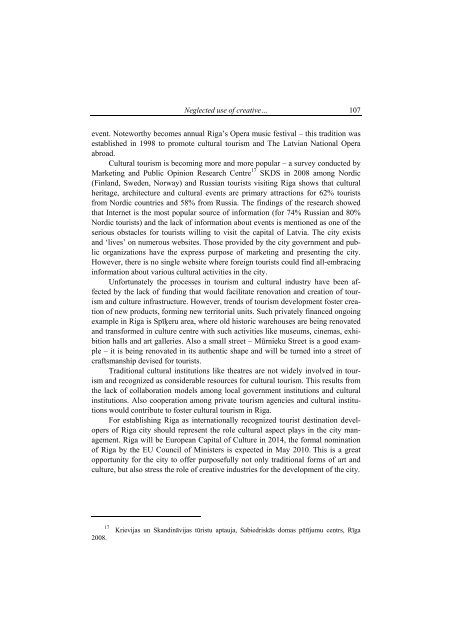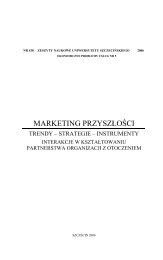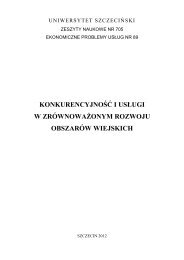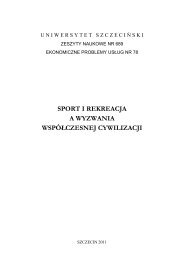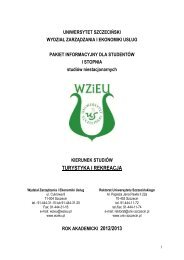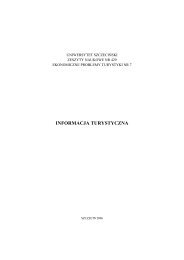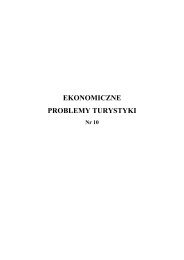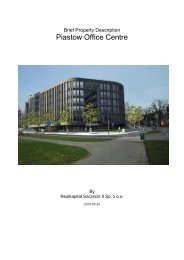Zeszyt naukowy - caÅoÅÄ - WydziaÅ ZarzÄ dzania i Ekonomiki UsÅug
Zeszyt naukowy - caÅoÅÄ - WydziaÅ ZarzÄ dzania i Ekonomiki UsÅug
Zeszyt naukowy - caÅoÅÄ - WydziaÅ ZarzÄ dzania i Ekonomiki UsÅug
Create successful ePaper yourself
Turn your PDF publications into a flip-book with our unique Google optimized e-Paper software.
Neglected use of creative… 107<br />
event. Noteworthy becomes annual Riga’s Opera music festival – this tradition was<br />
established in 1998 to promote cultural tourism and The Latvian National Opera<br />
abroad.<br />
Cultural tourism is becoming more and more popular – a survey conducted by<br />
Marketing and Public Opinion Research Centre 17 SKDS in 2008 among Nordic<br />
(Finland, Sweden, Norway) and Russian tourists visiting Riga shows that cultural<br />
heritage, architecture and cultural events are primary attractions for 62% tourists<br />
from Nordic countries and 58% from Russia. The findings of the research showed<br />
that Internet is the most popular source of information (for 74% Russian and 80%<br />
Nordic tourists) and the lack of information about events is mentioned as one of the<br />
serious obstacles for tourists willing to visit the capital of Latvia. The city exists<br />
and ‘lives’ on numerous websites. Those provided by the city government and public<br />
organizations have the express purpose of marketing and presenting the city.<br />
However, there is no single website where foreign tourists could find all-embracing<br />
information about various cultural activities in the city.<br />
Unfortunately the processes in tourism and cultural industry have been affected<br />
by the lack of funding that would facilitate renovation and creation of tourism<br />
and culture infrastructure. However, trends of tourism development foster creation<br />
of new products, forming new territorial units. Such privately financed ongoing<br />
example in Riga is Spīķeru area, where old historic warehouses are being renovated<br />
and transformed in culture centre with such activities like museums, cinemas, exhibition<br />
halls and art galleries. Also a small street – Mūrnieku Street is a good example<br />
– it is being renovated in its authentic shape and will be turned into a street of<br />
craftsmanship devised for tourists.<br />
Traditional cultural institutions like theatres are not widely involved in tourism<br />
and recognized as considerable resources for cultural tourism. This results from<br />
the lack of collaboration models among local government institutions and cultural<br />
institutions. Also cooperation among private tourism agencies and cultural institutions<br />
would contribute to foster cultural tourism in Riga.<br />
For establishing Riga as internationally recognized tourist destination developers<br />
of Riga city should represent the role cultural aspect plays in the city management.<br />
Riga will be European Capital of Culture in 2014, the formal nomination<br />
of Riga by the EU Council of Ministers is expected in May 2010. This is a great<br />
opportunity for the city to offer purposefully not only traditional forms of art and<br />
culture, but also stress the role of creative industries for the development of the city.<br />
17<br />
2008.<br />
Krievijas un Skandināvijas tūristu aptauja, Sabiedriskās domas pētījumu centrs, Rīga


